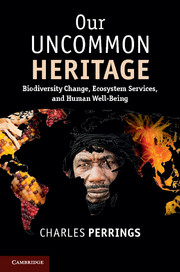Preface
Published online by Cambridge University Press: 05 June 2014
Summary
Preface
This book marks the end of a journey that began twenty-two years ago when I accepted an invitation from Karl-Göran Mäler, the newly appointed Director of the re-formed Beijer Institute at the Royal Swedish Academy of Sciences, to lead an interdisciplinary research program on biodiversity. That program brought together around forty social and natural scientists, and charged them with exploring the anthropogenic dimensions of biodiversity change. The results were summarized in three volumes (Barbier, Burgess and Folke 1994; Perrings et al. 1994, 1995).
They were heady times. The 1992 UN Conference on Environment and Development (UNCED) had concluded with a declaration of the intention of the governments represented there to achieve “a new and equitable global partnership through the creation of new levels of cooperation among States, key sectors of societies and people . . .which respect the interests of all and protect the integrity of the global environmental and developmental system.” The Conventions on Biodiversity, Climate Change, and Desertification were opened for signature at the conference.
- Type
- Chapter
- Information
- Our Uncommon HeritageBiodiversity Change, Ecosystem Services, and Human Wellbeing, pp. xxvii - xxxviPublisher: Cambridge University PressPrint publication year: 2014

